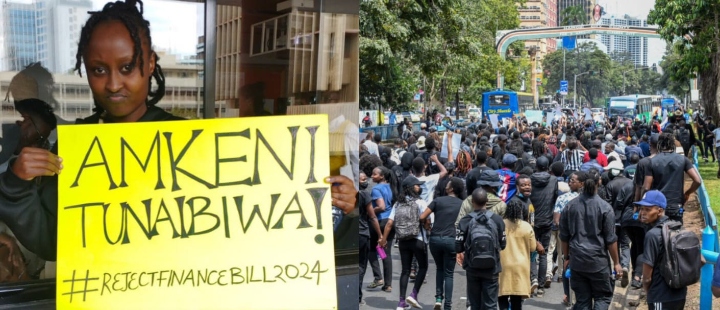Editor’s note: Ben Omondi writes on why the Finance Bill 2024 protests must continue until Parliament passes punitive anti-graft laws.
June 18 will be remembered as a date that Kenya’s Gen Z proved that they might be the changemakers the country has been waiting for.
The protests that took place in Kenya’s capital, Nairobi, have everyone talking because they were organised.
The protests were also peaceful, devoid of the usual hooliganism characterised by opposition-called protests.
What’s more, the protests organised through social media also kept to the theme of rejecting the Finance Bill 2024.
Also, this group, born between 1997 and 2012, articulated their messages well even while in police custody.
A keen observer may even have noticed that the police were rather gentle on the protesters.
On several occasions, the protesting youths even told the police they were also fighting for their welfare.
Throughout the protests, the protestors stuck to the mantra of deconstructing and rejecting the contents of the Finance Bill 2024, as opposed to the usual political party sloganeering common with such protests.
Content creation
Yet the Gen Z protestors were not solely on the streets to demonstrate against the Finance Bill 2024.
Apart from protesting, the youth took advantage of the situation to shoot great content for their platforms on YouTube, Facebook, and TikTok.
This, if you ask me, is a genius idea, given that a good majority of Gen-Z are living on the platforms by posting content.
Were the Gen-Z-led protests successful?
Tuesday’s protests, by any measure, were quite successful.
The fact that the government decided to strike off the punitive parts of the bill is a testament to the fact that the leaders noticed that it was not business as usual.
Even President William Ruto spent the better part of Tuesday explaining to Kenyans why paying taxes was necessary.
He even hailed the robust discussion elicited by the Finance Bill 2024, saying it underscored the country’s democratic ideals.
What’s next
Gen-Z, activists, and ultimately all Kenyans who must seize the moment and demand that MPs pass punitive laws to address the thorny issue of corruption in government.
Apart from laws stopping state officers from doing business with the government, Parliament ought to pass laws that will heavily punish those involved in graft.
President Ruto must understand that Kenyans are angry because the majority of the taxpayers’ money ends up in people’s pockets.
While EACC under Ruto has, within two years, done better than Mwai Kibaki and Uhuru Kenyatta eras combined, Kenyans still expect more.
It is disturbing that political leaders, state officers, and top managers in the civil and public services steal billions of taxpayers’ money with no repercussions.
This is worrying for a country with a huge number of unemployed youths, some boasting prestigious degrees such as medicine and engineering.
We must, as a country, stop this form of madness where a few people steal tax payers’ money with no consequences.
We can achieve this by having laws that spell heavy fines, confiscation of property, imprisonment, or death for those found engaging in corruption.
However, MPs can only pass this law under pressure from the public.
Currently, most politicians would oppose such a law as they exploit corruption in government for survival.
Or why is securing a political seat in Kenya a matter of life and death?
Or why would a politician spend KSh 120 million to campaign for an MP seat whose total net earnings within five years are about KSh 60 million?
READ ALSO: What President Ruto Must Do to Be Reelected in 2027
We must reject the entrenchment of corruption as Kenya’s fourth factor of production.
Gen Z protestors and all Kenyans must not relent until there are laws in place to deal with wanton corruption and wastage in government.
The opinions expressed in this article are solely those of the writer and do not necessarily reflect the position of GOTTA.news. We welcome writers to give their views on various social issues. Send your opinion to info@gotta.news.






















